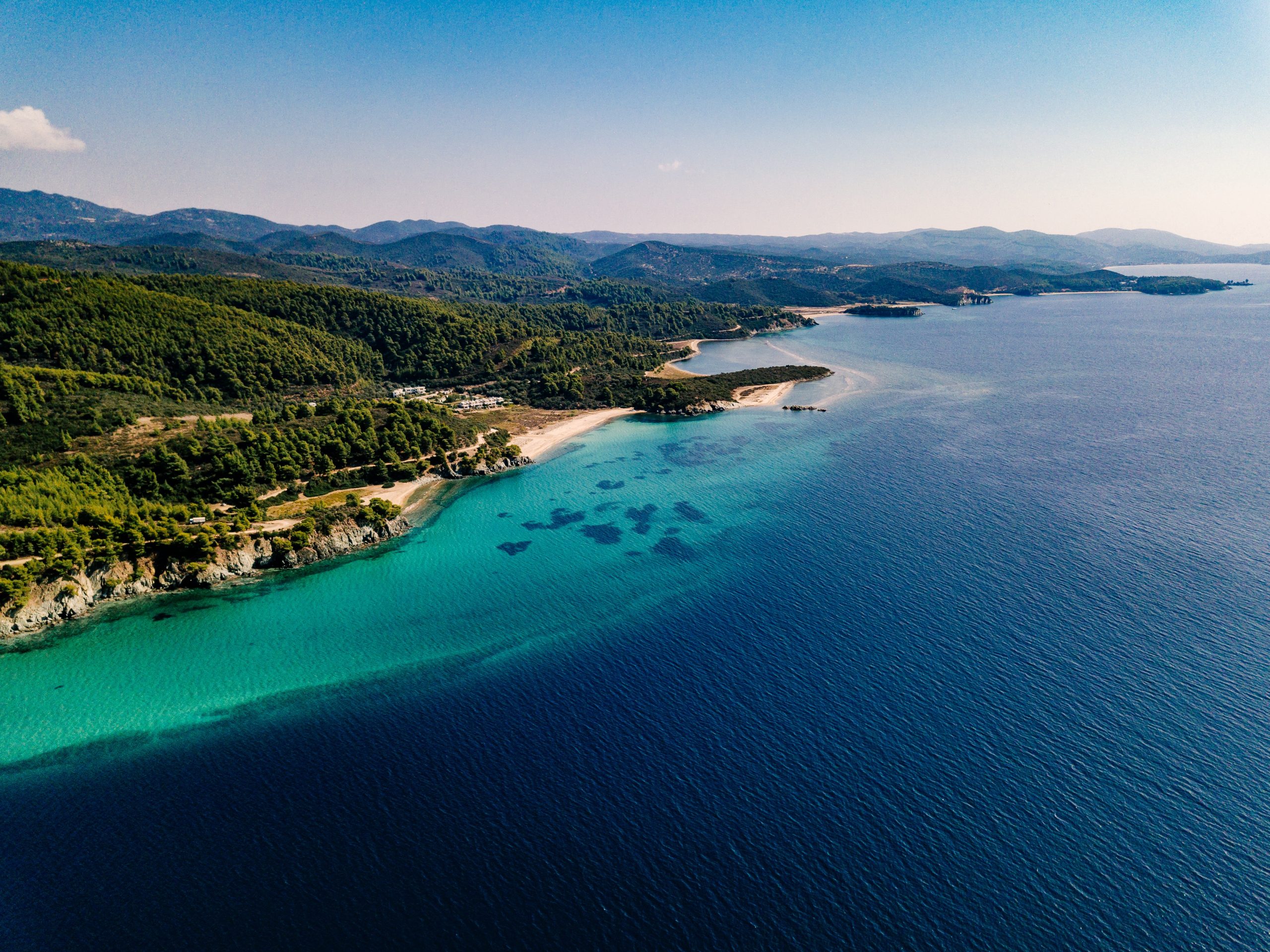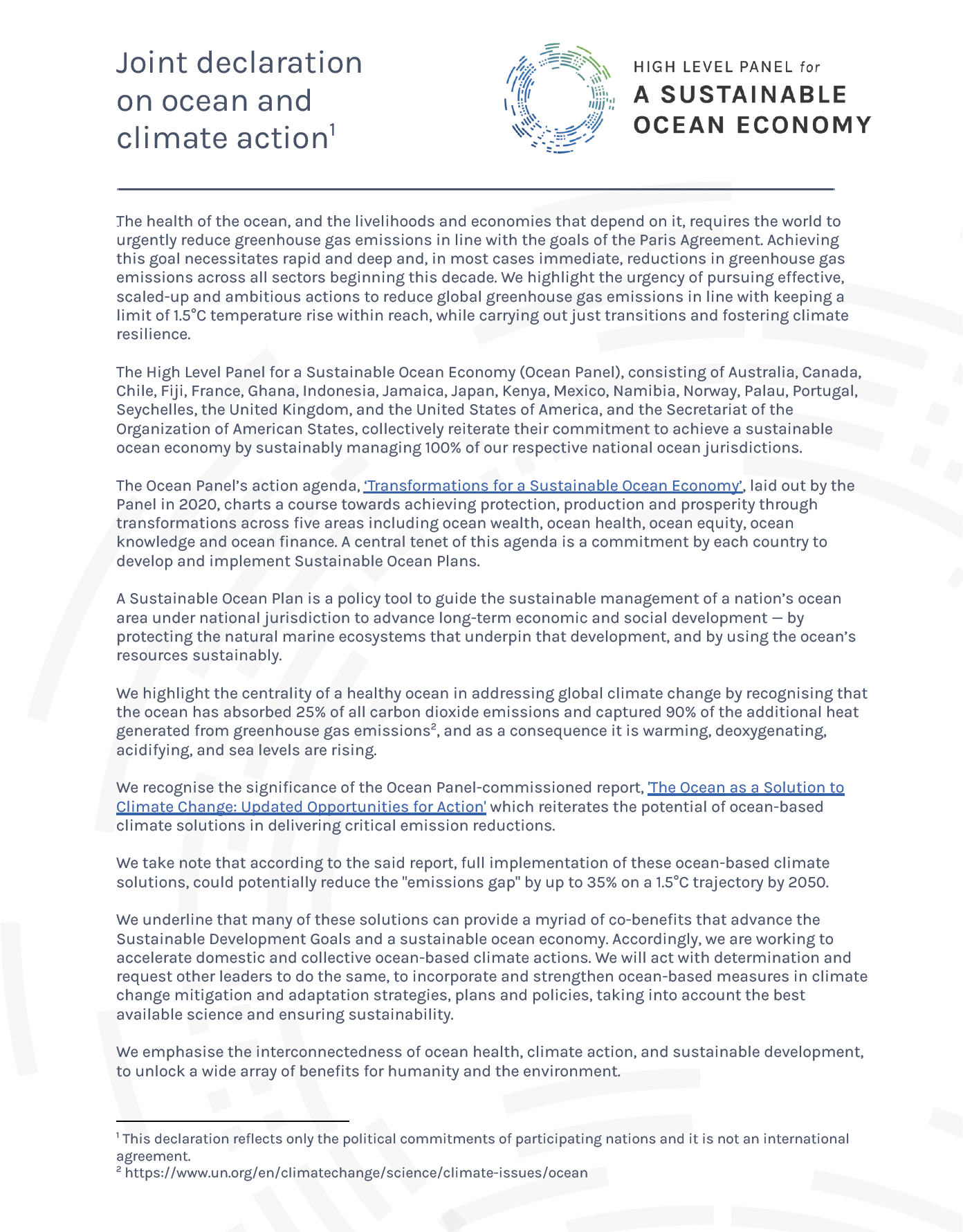The health of the ocean, and the livelihoods and economies that depend on it, requires the world to urgently reduce greenhouse gas emissions in line with the goals of the Paris Agreement. Achieving this goal necessitates rapid and deep and, in most cases immediate, reductions in greenhouse gas emissions across all sectors beginning this decade. We highlight the urgency of pursuing effective, scaled-up and ambitious actions to reduce global greenhouse gas emissions in line with keeping a limit of 1.5°C temperature rise within reach, while carrying out just transitions and fostering climate resilience.
The High Level Panel for a Sustainable Ocean Economy (Ocean Panel), consisting of Australia, Canada, Chile, Fiji, France, Ghana, Indonesia, Jamaica, Japan, Kenya, Mexico, Namibia, Norway, Palau, Portugal, Seychelles, the United Kingdom, and the United States of America, and the Secretariat of the Organization of American States, collectively reiterate their commitment to achieve a sustainable ocean economy by sustainably managing 100% of our respective national ocean jurisdictions.
The Ocean Panel’s action agenda, ‘Transformations for a Sustainable Ocean Economy’, laid out by the Panel in 2020, charts a course towards achieving protection, production and prosperity through transformations across five areas including ocean wealth, ocean health, ocean equity, ocean knowledge and ocean finance. A central tenet of this agenda is a commitment by each country to develop and implement Sustainable Ocean Plans.
A Sustainable Ocean Plan is a policy tool to guide the sustainable management of a nation’s ocean area under national jurisdiction to advance long-term economic and social development — by protecting the natural marine ecosystems that underpin that development, and by using the ocean’s resources sustainably.
We highlight the centrality of a healthy ocean in addressing global climate change by recognising that the ocean has absorbed 25% of all carbon dioxide emissions and captured 90% of the additional heat generated from greenhouse gas emissions2, and as a consequence it is warming, deoxygenating, acidifying, and sea levels are rising.
We recognise the significance of the Ocean Panel-commissioned report, ‘The Ocean as a Solution to Climate Change: Updated Opportunities for Action’ which reiterates the potential of ocean-based climate solutions in delivering critical emission reductions.
We take note that according to the said report, full implementation of these ocean-based climate solutions, could potentially reduce the “emissions gap” by up to 35% on a 1.5°C trajectory by 2050.
We underline that many of these solutions can provide a myriad of co-benefits that advance the Sustainable Development Goals and a sustainable ocean economy. Accordingly, we are working to accelerate domestic and collective ocean-based climate actions. We will act with determination and request other leaders to do the same, to incorporate and strengthen ocean-based measures in climate change mitigation and adaptation strategies, plans and policies, taking into account the best available science and ensuring sustainability.
We emphasise the interconnectedness of ocean health, climate action, and sustainable development, to unlock a wide array of benefits for humanity and the environment.
Accordingly, we reaffirm our commitment to the adoption of ambitious climate measures to align the world with the goals of the Paris Agreement and to restore ocean health, and reiterate our determination to develop and implement Sustainable Ocean Plans, and urge fellow nations:
- To consider, as appropriate, ocean-based action in their national climate goals and in the implementation of these goals, including but not limited to Nationally Determined Contributions (NDCs), long-term strategies and adaptation communications.
- To commit to the goal of sustainable management of 100% of ocean areas under national jurisdiction, guided by Sustainable Ocean Plans.
- To develop Sustainable Ocean Plans as a vehicle to accelerate the implementation of ocean-based climate actions, and to incorporate and strengthen ocean-based climate actions in relevant strategies, plans and policies, acknowledging the urgency and significance of sustainable ocean management by 2030.3
In the pursuit of these shared objectives, we hereby declare our firm commitment to sustainable management of our ocean areas, the expeditious development of Sustainable Ocean Plans as a credible basis for safeguarding the long term health and resilience of the ocean, and we urge all coastal and ocean states to join us in this endeavor.
|
Australia |
Canada | Chile |
|
Fiji |
France |
Ghana |
|
Indonesia |
Jamaica |
Japan |
|
Kenya |
Mexico |
Namibia |
|
Norway |
Palau |
Portugal |
| Republic of Seychelles |
United Kingdom |
United States of America |
|
General Secretariat of the Organization of American States4 |
||
Dubai, December 2023.
1This declaration reflects only the political commitments of participating nations and it is not an international agreement.
2 https://www.un.org/en/climatechange/science/climate-issues/ocean
3inspired by the guide: 100% Sustainable Ocean Management An introduction to Sustainable Ocean Plans.
4 The General Secretariat of the Organization of American States, comprised of the following member countries: Antigua and Barbuda, Argentina, Barbados, Belize, Bolivia, Brazil, Canada, Chile, Colombia, Costa Rica, Cuba, Dominica (Commonwealth of), Dominican Republic, Ecuador, El Salvador, Grenada, Guatemala, Guyana, Haiti, Honduras, Jamaica, Mexico, Nicaragua, Panama, Paraguay, Peru, Saint Kitts and Nevis, Saint Lucia, Saint Vincent and the Grenadines, Suriname, The Bahamas (Commonwealth of), Trinidad and Tobago, the United States of America, Uruguay, and Venezuela (Bolivarian Republic of).


 Previous
Previous



